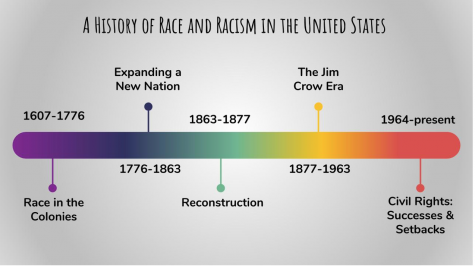History of Racism
February 4, 2021

The racism that we experience and see evidence of today in America traces its roots back to a time even before this country was founded. By the time America established its independent government and Constitution, racism was so entrenched in the culture and economy, that almost 250 years after America declared its independence, this country is still struggling to cleanse itself of racism. Shootings in synagogues, police brutality and killings against African Americans and evidence of racism in the clothing and flags displayed by the rambunctious mob that broke into the Capitol building recently demonstrate racism remains instilled in our society.
Dating back to the mid 16th century, approximately 12.5 million were kidnapped from Africa and sold as slaves in America. These individuals were forced into hard labor, often receiving undeserved punishments. Families were split. Living conditions were deplorable. They were treated as property and not as humans. Those who attempted to escape were severely beaten or killed.
These crimes against humanity benefited white, wealthy landowners. Slaves would produce crops that were traded to bring additional wealth to the landowner. These landowners received all benefits, the protection of the laws, and were active in politics and government. While the economy and the laws were meant to benefit these individuals, America developed a culture of disparate treatment based on skin color.
America’s Constitution memorialized the prejudicial belief and made it impossible for African Americans to be treated as equals. Originally, the Constitution counted African Americans as ⅗ of a person for the purpose of determining Congressional representation. Many of those in government had no intention of freeing the enslaved and engaged in heated debates in Congress, trying to spread slavery to new American territories.
Even after the Northern free states defeated the Southern slave states in the Civil War, a large percentage of the population including individuals involved in government stayed true to their racist ideologies. A hundred years after the Civil War, African Americans still had to contend with Jim Crow laws that prohibited them from attending the same schools and businesses as white individuals.
Against this long-standing backdrop of hatred and demeaning treatment, Martin Luther King Jr, a minister and activist, instilled hope and lit the path for change toward civil rights and equal treatment for African Americans. Through peaceful protest and marches, he spread awareness of the biased and unjustified system in America. Even though he was consistent in his message of non-violence, he himself was the target of much violence, having had his house firebombed and surviving a stabbing attack before he was assassinated. Martin Luther King Jr.’s work led to important laws that gave African Americans the right to vote, ended segregation in public places, and ended employment discrimination based on race.
Now, over 50 years after Martin Luther King Jr. left his mark on American history, racism still drives many people’s behavior in America. While racism has continued to exist throughout many institutions in America since Martin Luther King Jr’s time, incidences of racial injustice and violence have increased over the past four years. The Black Lives Matter movement was established in 2013 to address the inequity in how law enforcement treats African Americans suspected of criminal behavior compared to how the system treats white Americans in the same position. During its marches over the past year, demonstrators on behalf of the movement were sprayed with chemicals or killed.
In the attack on the US Capitol that took place January 6th, the domestic terrorists made clear that they not only supported President Trump’s political ideals, but their deep-rooted racist thinking. Television cameras have repeatedly shown that at least one insurrectionist carried the Confederate flag, promoting the atrocities of the slave system. Another, was shown advertising Nazi propaganda.
Despite celebrations that may take place on Martin Luther King Day and throughout Black History Month, racism remains a contentious issue in America that must be resolved.